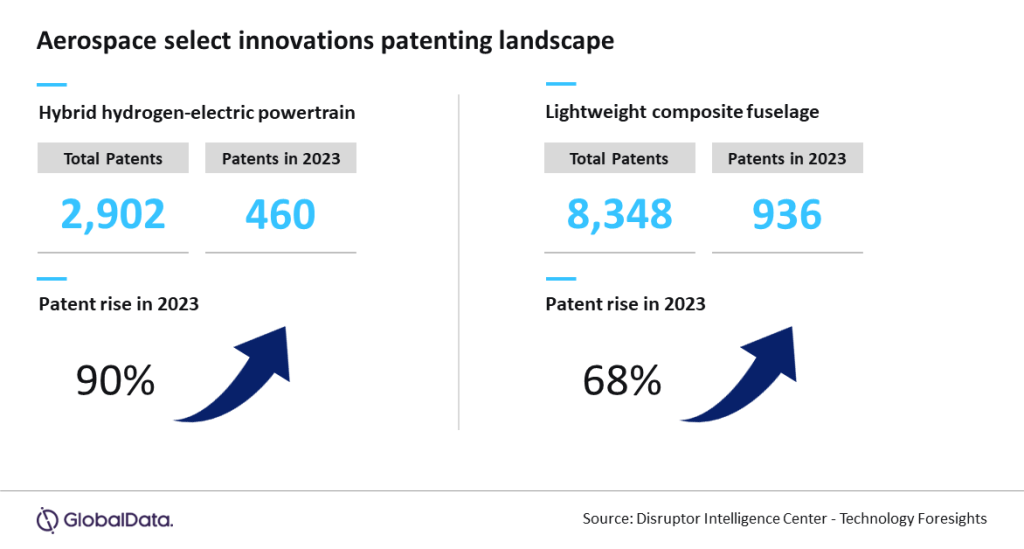
The aerospace sector is undergoing significant changes, fueled by advancements in electrification, alternative fuelling and powertrain technology, and composite materials to create a “green airplane”.
As manufacturers struggle to meet global emissions targets, the rise in patent filings for hybrid hydrogen-electric powertrains and lightweight composite fuselages highlights the growing desire for hydrogen engines and eco-mobility.
GlobalData’s latest FutureTech report Tech Frontiers: The Aerospace Edition revealed a 90% rise in patent filings for hybrid hydrogen-electric powertrains and a 68% increase for lightweight composite fuselage in 2023. These technologies, along with innovations in thermal management systems, have the potential to enhance fuel efficiency, reduce emissions, and reshape both commercial and defense aviation, according to company analysts.

Vaibhav Gundre, Disruptive Tech manager at GlobalData said: “Electrification and composite materials are no longer future concepts—they are now central to the transformation of the aerospace sector. The patent filings highlight that market leaders are rapidly adopting these technologies, driven by regulatory pressures and the need to reduce fuel costs.
“The challenge lies in scaling these innovations while navigating complex regulations.”
GlobalData’s report analyses the key innovations, including hybrid hydrogen-electric powertrains, lightweight composite fuselages, and advanced thermal management systems, identified through its proprietary “Technology Foresights” tool.
Rahul Kumar Singh, Disruptive Tech analyst at GlobalData, added: “Hybrid hydrogen-electric powertrains offer a strategic solution for reducing carbon emissions in short-to-medium haul flights.
“At the same time, lightweight composite materials significantly improve operational efficiency in long-haul flights by reducing aircraft weight. However, challenges remain around the production costs, material durability, and retooling existing manufacturing lines.”
Market movers
Avio Aero, a GE Aerospace company, launched a hybrid-electric technology demonstration program in Europe in June 2024, focused on integrating advanced propulsion systems to reduce emissions and significantly improve operational efficiency in aerospace.
Airbus subsidiary UpNext introduced superconducting technologies for electric propulsion systems in future hydrogen-powered aircraft, advancing efforts to accelerate the transition towards more sustainable aviation, in May 2024.
French hydrogen fuel cell developer H3 Dynamics has been selected as the fuel cell supplier for an EU-funded research project HyPoTraDe’s modular hydrogen powertrain system. The company will supply its newest class of aviation-grade fuel cell systems for the project, which is powered by a consortium led by Textron subsidiary Pipistrel in partnership with Honeywell International, Netherlands Aerospace Centre, and Fraunhofer Society.
HyPoTraDe is partially funded by the EU’s Clean Aviation joint undertaking and is designing and testing 500kW modular fuel cell-battery hybrid-electric distributed electric propulsion (DEP) powertrain architecture for use on small aircraft.
Meanwhile, engineers at the German Aerospace Center (DLR), in collaboration with Airbus, Aerotec, and Aernnova, developed a fuselage demonstrator made from carbon-fiber-reinforced thermoplastic in October 2023 to reduce aluminum use, lower aircraft weight, and enhance fuel efficiency.
Germany remains a leader in aviation innovation, as Airport Technology discovered at ILA Berlin earlier in 2024. You can read our summary of the event, and its focus on future fuels, here.
Singh concluded: “While these technologies offer significant promise, scaling production remains a challenge due to high costs and specialized manufacturing needs. Regulatory frameworks must evolve to keep pace with innovation. Infrastructure, like charging solutions for hybrid-electric systems and production facilities for advanced composites, must also grow to support widespread adoption.”



